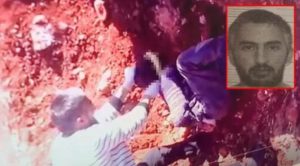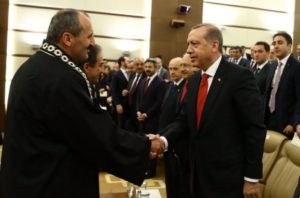Abdullah Bozkurt/Stockholm
Two judges on Turkey’s Constitutional Court appointed by Turkish President Recep Tayyip Erdoğan said in dissenting opinions that the rights of a convicted Islamic State in Iraq and Syria (ISIS) terrorist who executed people in Syria had been violated.
Yusuf Şevki Hakyemez and Hasan Tahsin Gökcan, handpicked by the president for the bench of Turkey’s top court, dissented from the majority in the case of İrfan Yıldız, a man convicted on ISIS charges who escaped from prison, saying his rearrest violated his rights.
Yıldız and his associates — Gökhan Bulut, Raşit Karadağ and Duran Çoban — all Turkish nationals, were first detained on June 14, 2015 in Kocaeli province during a police operation on a highway searching for drug traffickers. When police stopped two cars with Ankara and Istanbul license plates, they found five hand grenades, one IED, three handguns and two silencers. The suspects presented forged IDs to the police.
Yıldız and his jihadist comrades were tried but avoided the ISIS charges and were convicted only of illegal arms trafficking. Another case was launched against them in Istanbul on organized crime and ISIS charges.
A year later they were transferred to a minimum security facility in Kocaeli province under new and relaxed rules introduced by the Erdoğan government. Police intelligence warned the prison administration that all five planned to escape and travel to Syria to join up with ISIS and urged enhanced security measures. Yet Yıldız and his associates broke out of the prison on May 3, 2016.
The indictment reveals how ISIS militant İrfan Yıldız was caught while transporting cash to the families of terrorist organization members:
According to the indictment, the suspects were part of an ISIS cell known as the Sultanbeyli Group, which established an ISIS fighting unit under the name of Sultanbeyli Katibah. They not only travelled to Syria to join combat with ISIS but also recruited Turks for the jihadist group.
On January 19, 2017 Yıldız was caught with a fake ID while running a cash delivery for ISIS members and was formally arrested and jailed pending trial. When the police frisked him, bundles of cash with the names of ISIS militants on them were found, suggesting that he was en route to delivering cash to family members of ISIS fighters.
The content of his seized Samsung phone revealed frequent communications with other ISIS members via Telegram and dozens of ISIS-related pictures including photos of Abu Bakr al-Baghdadi. He and three other suspects were indicted in March 2017 on ISIS and forgery charges. The court later ruled for his release.

In the fall of 2017 he was arrested again while running surveillance with a hidden camera around an Alevi cemevi (house of worship) in the Ümraniye district of Istanbul. The surveillance was part of a planned ISIS attack on the cemevi.
What is more, an examination of his phone revealed video footage showing him beheading a man named Mohammed Shami in Syria. The Ankara police crime lab verified that the man with a knife in the footage was in fact Yıldız. During a hearing at the Istanbul 26th High Criminal Court on July 4. 2018, Yıldız admitted to beheading people in Syria and even submitted a CD containing video footage of the decapitations to the court. He also acknowledged that he worked for ISIS.
Yet Turkish authorities let him go again on March 27, 2019. Yıldız continued to operate on behalf of ISIS and travelled back and forth between Turkey and Syria.
In December 2019 he was caught again during a police operation on an ISIS network that was raising funds on behalf of the terrorist organization through robbery and theft. On February 2, 2020 Yıldız filed a complaint with the Constitutional Court claiming that his rearrest in 2019 violated his fundamental rights. He alleged that the second arrest was arbitrary because the evidence that had led to his first arrest in 2017 had not changed and that there was no reason to warrant his second arrest.
ISIS militant İrfan Yıldız admitted beheading people in Syria according to the hearing transcript:
The justice ministry challenged his claim, saying that new evidence had been uncovered since 2017 showing that Yıldız’s position within ISIS was clearer than before.
On June 25, 2020 he was convicted of both forgery and membership in ISIS and sentenced to 10 years in prison. The conviction was upheld by a regional appellate court on September 22, 2020.
In its ruling issued on January 13, 2022 the five-judge panel of the First Chamber of the Constitutional Court ruled three to two that the authorities did not violate Yıldız’s fundamental rights. Judge Hakyemez and presiding judge Gökcan disagreed with the majority vote.


In the meantime, in February 2021, an indictment against Yıldız over the beheading of a Syrian man was finally submitted to the Istanbul 33rd High Criminal Court. In a statement that was incorporated in the indictment, Yıldız admitted killing the Syrian man, saying that he was already wounded and would die anyway and beheaded him under orders from his commander, Ahmet Turan, aka Abu Bour, also a Turkish national. Both face life in prison if convicted.
Full text of the Constitutional Court ruling:












